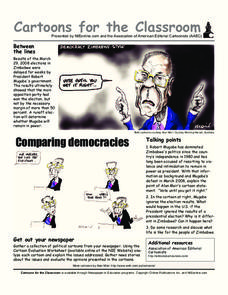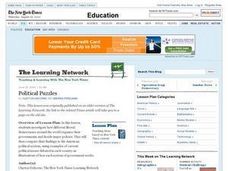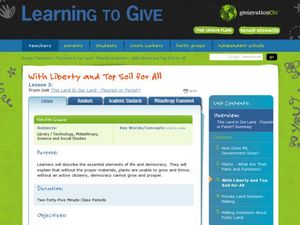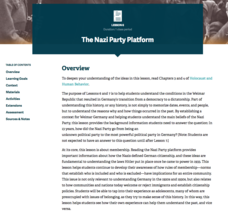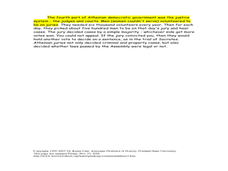Curated OER
Cartoons for the Classroom: Comparing Democracies
Could a president just ignore election results? For this analysis handout, scholars consider this question as they read background information on the 2008 elections in Zimbabwe. Two political cartoons poke fun at President Robert Mugabe,...
Museum of Tolerance
Citizenship Then and Now: Comparing Ancient Rome and Contemporary American Society
Class members research citizenship in Ancient Rome and in the United States and use the provided graphic organizers to compare the rights and responsibilities of citizens in these two democracies.
Curated OER
Who's The Boss?
Upper elementary and middle schoolers research and analyze some different types of governments. Democracies, Monarchies, and Dictatorships are some of the types that are looked at. Learners use the Internet to gather information that...
Curated OER
Cartoons for the Classroom: Comparing Democracies
In this current events worksheet, students analyze a political cartoon about elections in Zimbabwe and respond to 3 talking point questions.
Curated OER
Democracies in North America: Canada, the United States, and Mexico
Students examine democratic values. In this democracy lesson, students research the political systems of Canada, Mexico, and the United States in order to compare and contrast them. Students also discuss domestic and international events...
Curated OER
Delegating Authorities
Students compare and contrast democracies around the world after reading a New York Times article. They create posters and participate in a "democracy roundtable" in which they discuss two democracies.
Deliberating in a Democracy
Juvenile Justice
Pupils compare and contrast the legal system as it pertains to juvenile and adult crime and punishment. Incorporating primary documents, legal decisions, and video evidence, individuals form an argument debating the treatment of...
Curated OER
Comparative Government: Japan & the United States
Students compare the governmental systems of Japan and the United States. As a class, they discuss the differences between the parliamentary system and the presidential system. Pupils read provided handouts about the duties of a a...
Curated OER
Political Puzzles
Students investigate how different liberal democracies around the world organize their governments and decide major policies. They compare their findings to the American political system, using examples of current political issues.
Curated OER
Juvenile Offenders
Students investigate how different democracies treat juvenile offenders as well as compare/contrast the juvenile and adult justice systems in their own democracy. In addition, individually and as a group, they determine whether juvenile...
Museum of Tolerance
The Role of Citizens in a Participatory Democracy
Groups research participatory democracies and compare the role and rights of citizens in ancient history with those in recent U.S. history. Guided by a series of questions, individuals compose a persuasive essay in which they discuss the...
Curated OER
Good Citizens
Students consider what qualities and values make a good citizen. Students compare the requirements to become a U.S. citizen in 1896 to current requirements. Students create a country and write out the qualities a good citizen would possess.
Curated OER
To Be or Not to Be Democratic
Seventh graders explore the democratic republic principles of U.S. government. In this U.S. government lesson, 7th graders compare and contrast the governments of ancient Athens,the Roman Republic, and the United States today. Students...
Curated OER
When Property Rights and the Public Good Clash
Middle schoolers analyze a case involving a government's use of eminent
domain powers to construct a comprehension of property rights and how they might be viewed as essential protections for citizens in a constitutional democracy. They...
Curated OER
Hitler's Fatal Gamble
Learners consider the differences between totalitarianism and democracy. In this comparative politics instructional activity, students will read a handout describing the major components that comprise totalitarianism and democracy,...
Curated OER
With Liberty & Top Soil for All
Middle schoolers compare the basic needs of plants to the basic needs of democracy. In this democracy comparison instructional activity, students complete a worksheet on what happens to a plant that's not nourished. Middle schoolers draw...
Facing History and Ourselves
The Nazi Party Platform
Not all party platforms stay democratic. A resource covers many political issues in Germany during the time of World War II, and teaches pupils about the Nazi party platform and what went wrong. Individuals participate in a warm-up...
Curated OER
Communism
Seventh graders study communism. In this world history instructional activity, 7th graders discuss the similarities and differences between communism and democracies by writing Venn Diagrams.
Curated OER
Architecture and Democracy
Fifth graders contrast and compare ancient Greece to the U.S.A. In this Greek History lesson, 5th graders investigate the buildings and designs of ancient Greece, as well as their democracy and government. Students answer questions...
Carolina K-12
Get Out the Vote!
What better way to have a class learn about get out the vote campaigns than by having them create one themselves? After introducing get out the vote efforts and why they exist through videos, articles, and discussion questions, the...
Curated OER
What Does It Mean To Be a Good Citizen?
Students study citizenship and what it means to be a good sitizen. They create their own country and determine its citizenship rules. They work together to create a visual representation of what makes a good citizen.
Curated OER
Voting And Elections
Students examine the voting practices of the past several presidential elections while using data to determine the influence of different factors. They identify the reasons for high or low voter turnout and then display the outcome of...
Curated OER
McMUN Model United Nations
If you have been searching for a plan to run a model U.N. simulation, this plan provides some bare bones for your lesson. Scholars break into blocs to research and discuss global issues and come up with collaborative solutions. In their...
Curated OER
East Asia
Students participate in research of various government leaders in order to have the ability to role play in a mock press conference. Students are the leaders and the press for this lesson using guided questions for the skits.


